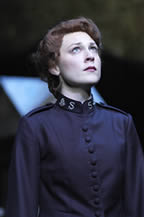SEARCH
REVIEWS
FEATURES
NEWS
Etcetera and
Short Term Listings
LISTINGS
Broadway
Off-Broadway
BOOKS and CDs
OTHER PLACES
Berkshires
London
LA/San Diego
Philadelphia
Elsewhere
QUOTES
On TKTS
LETTERS TO EDITOR
FILM
LINKS
MISCELLANEOUS
Free Updates
Masthead
Writing for us
A CurtainUp Review
Major Barbara
By James Moore
|
Andrew did it on principle, just as he did every perverse and wicked thing on principle.-- Lady Britomart The more destructive war becomes the more fascinating we find it.-- Andrew Undershaft |

Diana Donnelly as Barbara Undershaft in Major Barbara
(Photo: Andrée Lanthier)
|
By 1905 what might be called Britain's second industrial revolution was well underway. England's cities were already teeming masses of poverty and despair, due in large part to the effects of the first industrial revolution of the mid-eighteenth century, when the shift from English agrarian society to centralized populations began in earnest. From that inner urban nightmare sprang the Salvation Army, founded by William Booth to wage war against sin, corruption and the human misery that had become an inherent part of urban English life. During that same period Alfred Nobel invented dynamite, and industrialists like Andrew Carnegie perfected the large-scale manufacture of steel. The result was the real beginning of the era of weapons of mass destruction, and the world's insatiable appetite for those weapons made Nobel and Carnegie enormously wealthy men. At the same time, their names became synonymous with charity and good deeds, an irony that was not lost on Shaw. In Major Barbara he brings together the armies of the good and the wicked, and forces each to reconcile itself to life with the other. That task proves much more difficult for the forces of good to accomplish.
Barbara Undershaft is the daughter of a very Carnegie-like manufacturer of weapons. The senior Undershaft is however estranged from the rest of the family, due to his wife's objections to the nature of his business and his insistence that blood relatives should not inherit his fortune. A "foundling" himself, Undershaft is determined to pass control of his industrial empire on to another adopted orphan. Meanwhile the beneficent Barbara has risen rapidly in the ranks of the Salvation Army, encouraged by her rather cerebral fiancée Adolphus. Barbara's impending marriage and the inevitable need of an income force her mother, Lady Britomart Undershaft, to seek a reconciliation of sorts with her husband. When they meet, Andrew Undershaft is immediately taken by his daughter's strength of character and her good deeds, perhaps recalling the charity that was shown to him as a young orphan. When she agrees to involve him in her Salvation Army work however, her disillusionment begins. The Army quickly falls prey to the allure of Undershaft's fortune, and they manage to overlook the manner in which Undershaft managed to acquire it. Barbara is forced to recon with the altruistic Army's need to alleviate suffering by profiting from it. Eventually, to Barbara's further dismay, the rest of the Undershaft family is forced to do the same.
The 2005 production of Barbara is the Shaw's fifth, and the first since 1998. It is an impressive performance, and director Joseph Ziegler has succeeded in delivering Shaw's century-old yet still-pertinent message to a modern audience. The visual presentation of designer Christina Poddubiuk's massive sets is striking. When her urban London scene was unveiled at the beginning of the second act, the audience was sufficiently impressed to break out in spontaneous applause. Diana Donnelly as Barbara is excellent in the title role. She delivers a convincing performance of a woman who, in a William Blake sort of a way, must trade her songs of innocence for songs of experience.
For some, Barbara may not be an easy play to watch. Indeed, the play was vilified when it was first produced in 1905 as being too violent. The assaults that occur in the second act are of course quite tame by modern standards. But the play deals with issues that could, and probably should, make us uncomfortable. Wealth really is power, in spite of our present-day assertions to the contrary. If power corrupts, then absolute wealth corrupts absolutely. That lesson in Shaw's play, unfortunately, is one that we have yet to learn.
For an introductory feature about the festival go here.
| MAJOR BARBARA
Written by George Bernard Shaw Directed by Joseph Ziegler Cast: Evan Buliung (Charles Lomax), Andrew Bunker (Snobby Price), Benedict Campbell (Andrew Undershaft), Ben Carlson (Adolphus Cusins), Cathy Current (Salvation Army Member), Diana Donnelly (Barbara Undershaft), Sharry Flett (Rummy Mitchens), Patrick Galligan (Bill Walker), Charlotte Gowdy (Sarah Undershaft), Mary Haney (Lady Britomart Undershaft), Evert Houston (Salvation Army Member), Patty Jamieson (Mrs. Baines), Chilina Kennedy (Salvation Army Member), David Leyshon (Stephen Undershaft), Micheal Querin (Morrison/Bilton), Jay Turvey (Peter Shirley), Jenny L. Wright (Jenny Hill). Set and Costume Design: Christina Poddubiuk. Lighting Design: Kevin Lamotte. Running time: 3 hours, with two intermissions. Festival Theatre, 10 Queen's Parade Niagara-on-the-Lake Ontario, 800.511.7429 or 905-468-2172, http://www.shawfest.com From 6/10/05 to 10/29/05. Tuesday - Sunday at 2 or 8 pm; performance dates and times vary. Follow this link for current schedules and to order tickets online. Tickets: Weekdays C$69.00, C$59.00, C$49.00, Under 30 C$30.00; Under 18 C$34.50, C$29.50, C$24.50; Weekends C$82.00, C$69.00, C$59.00, Under 30 C$30.00; Under 18 C$41.00, C$34.50, C$29.50; Sunday Evenings C$50.00, C$42.00. Reviewed by James W. Moore based on July 6th performance. |

Easy-on-the budget super gift for yourself and your musical loving friends. Tons of gorgeous pictures.

>6, 500 Comparative Phrases including 800 Shakespearean Metaphors by our editor.
Click image to buy.
Go here for details and larger image.







